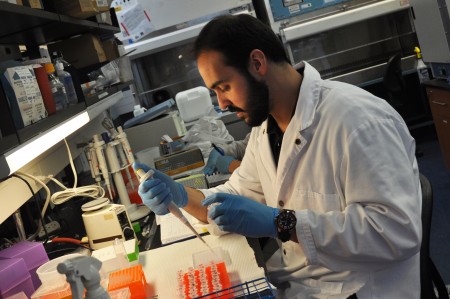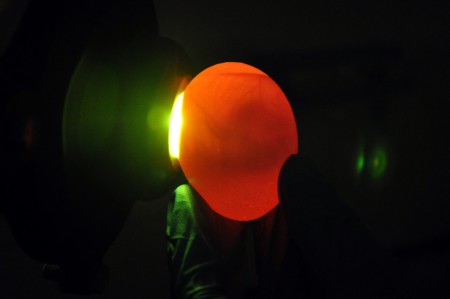
The chicken eggs in Prof. Shayan Sharif’s lab look like ordinary eggs, but they’re not. Some of them have been vaccinated against diseases that can cause illness in humans and have cost the poultry industry hundreds of millions of dollars.
“We are developing better ways of controlling microbes in chickens to stop the transmission from chickens to humans,” says Sharif, Department of Pathobiology. Microbes such as salmonella and campylobacter can cause food-borne illness in humans; avian flu outbreaks often result in culling poultry. His lab is looking at various ways to protect both chicken and human health.
One way to make chickens healthier is to boost their immune system by vaccinating them before they hatch. Sharif’s lab is investigating the efficacy of vaccines and vitamins that can be injected through the shell into the amniotic fluid. The embryonic chicks are vaccinated when they’re 18 days old and hatch after 21 to 22 days.
Shirene Singh, a PhD student in the lab, is studying tissues from chickens infected with avian influenza virus. “We’re looking for the presence of antibody-producing cells,” she says. Those cells are an indication that the chicks’ immune system is responding to the virus, which could lead to new avian flu vaccines.
Wanderley Quinteiro-Filho, a postdoctoral researcher and veterinarian from Brazil, tests the efficacy of vaccines and injections of vitamins such as A, D and E. Using a light beam to see inside each egg, he can find out which ones contain embryos. A live chick looks like a shadowy blob surrounded by veins. If there’s no chick inside the shell, it will appear empty.

He says veterinary studies typically focus on treating pets and livestock, but he was drawn to Sharif’s research at U of G because of its connection between animal and human health. “You not only work with the health of chickens, you try to improve the quality of food for the benefit of humans.”
Neda Barjesteh, a PhD student and veterinarian, uses real-time polymerase chain reaction to analyze gene expression in chicks. Using tissue samples from the tracheas and spleens of unvaccinated, vaccinated and infected chickens, she looks for specific genes responsible for the host responses involved in virus immunity.
“I’m interested in looking at the immune response in chickens, and how we can improve it and help the poultry industry,” she says. Another aim of the research is to reduce virus shedding in the environment. Treated chickens shed less virus because their immune system doesn’t allow the virus to replicate in their respiratory tracts.
Alexander Bekele-Yitbarek, a PhD student, studies how avian influenza affects gut microbes in chickens and whether probiotics could be used to boost their immune system against the disease.
Keeping people healthy is just as important as keeping chickens healthy, so the lab is looking at ways to make chicken meat safer for human consumption. Eating undercooked chicken can lead to campylobacter jejuni infection in humans, which can cause fever, diarrhea, vomiting and, in severe cases, paralysis. Post-doctoral researcher Khaled Abdelaziz is trying to find ways to control and reduce this microbe in chickens through vaccination.
“Campylobacter jejuni is common in chickens, but it doesn’t cause disease [in them],” he says.
A healthier food supply benefits both farmers and consumers, and the lab’s focus on chicken immunity can help stop disease outbreaks before they start.